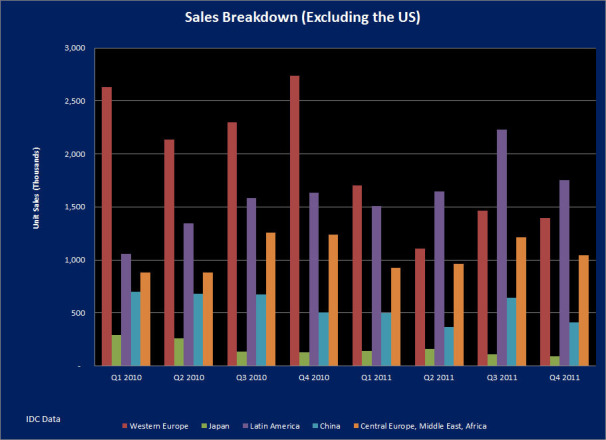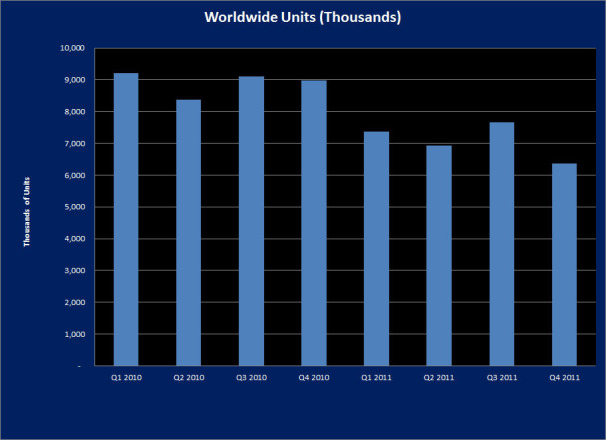Netbooks run out of life
Netbooks have been hailed as a star in the field of mobile computing devices. With the strong rise of tablets, will it last longer?
Does anyone still care about netbooks? Lightweight, lightweight laptops, long batteries and for simple tasks like surfing the web are now sinking into oblivion. Netbook sales plummeted sharply compared to 2010, a worldwide trend.
When netbooks came out in 2007, it seems to be the ideal choice for those who are on the move and are suitable primarily for surfing the web, online tasks or light office tasks. Its performance is limited in part by the processor used for netbooks are the first generation Intel Atom processors. In addition, the reduced version of Windows operating system is not entirely suitable for this device. With 1GB of RAM and a small keyboard in addition to the fact that most netbooks have 7-10 inch screens and poor resolution, this device didn't win the hearts of users.
Although there was a configuration limitation, netbooks created a niche in the field of laptops. It has a slightly rough design but is lightweight and affordable, plus the introduction of fast and stable 802.11n Wi-Fi. All of these factors make netbooks a hot commodity for manufacturers. Many businesses rushed into this area to gain a bigger market share in a potential niche market. The fastest one is to mention Asus with the Eee PC, which is considered the first netbook officially introduced to users.
Netbook sales fell
At the moment, netbook sales are falling dramatically. Big players like Dell have stopped selling this line, and HP seems to be targeting the focused Mimi1104 netbook for education (a kind of charity?). Netbooks are still found on shelves in electronics supermarkets and online stores, but new models are less pathetic. As for the pioneer of the netbook market, Asus seems to be attached to this market while still selling some products. IDG analyst David Daoud noted that netbook sales have "dropped significantly " since the beginning of 2010 in the US market and then worldwide.

The figures in the chart above show netbook sales in the US market in millions (source: IDC). Can see sales decline and will continue to decrease. The world market also follows this trend.

Netbook sales rose throughout Western Europe in 2010, but then plummeted the following year. Now only Latin America is still consuming netbooks. In general, the cult product of this time can only be sold in developing countries. But even in these areas, perhaps netbooks will soon die. See global netbook sales in the following chart to see this trend clearly.

What happens to netbooks is a clear demonstration of the phenomenon of new technologies that have led to old technologies being destroyed. Since launch, netbook users have pointed out performance issues, cramped keyboards and poor quality display screens. Then the manufacturers ' corrected ' by increasing the screen size, but along with it the product price increased and did not attract users.
The cause of the decline of netbooks
The most important cause first mentioned is the introduction of the iPad in April 2010. Since then and after Apple launched the iPad 2 in the first quarter of 2011, netbook sales declined markedly. But that does not mean that this decline is entirely caused by users not buying expensive netbooks to buy more affordable iPads (See also: iPad and rival tablets will eliminate remove netbook?).
According to analyst Daoud, this rapid decline is the result of many different factors. He said: ' The first is user hate for devices with poor screens and small keyboards. Well, this is when Apple attracted the public's attention to the tablet segment with its popular iPad product. Meanwhile, the traditional computer industry (PC) is restructuring its focus on higher-margin products such as ultrabooks and later tablet generations. All of these factors have caused the netbook market share to shrink dramatically . '
In other words, the decline of netbooks has a subjective origin from the product itself is unattractive to users, poor features and eye-catching design. On the objective side, it can be said that Apple's iPad has dramatically changed the demand of the mobile computing market. In addition, another important reason is that netbook profit margins are too low, making manufacturers less interested in this product.
The marketing manager for Dell's consumer product, Brian Pitstick, said netbooks do not meet user needs and do not meet the production cost requirements. As soon as Asus, businesses are still selling some products on the market are also aware of this problem. The company's marketing director, Kevin S. Huang, said: ' Asus created the netbook segment on the market, but I think today netbooks are an economic computing solution for certain user segments. , like the market for K-12 education '.
Manufacturers turned to ultrabook
Intel is one of the people who benefit the most from the introduction of netbooks with the provision of Atom processors for most netbooks sold. Intel's Kathryn M. Gill said the company is also aware of the decline in the netbook market but still believes in the potential of other markets.
" Intel thinks that different product lines like netbooks, tablets, hybrid computers and ultrabooks all have their own positions and values," she said. The market of global computing devices is growing, not slowing down. In other words, in the future we realize that devices will co-exist and serve different needs of users at different prices. We believe that Clover Trail and Cedar Trail processors from Medfield 32nm chip generation will win big in 2012. '
Apple is also partly responsible for the decline of netbooks with the launch of the attractive "MacBook Air" model at the end of 2010. This ultra-thin model has 11-inch and 13-inch models in place of the 13 models. inch expensive before, the 11.6-inch model priced at 999 USD in the US and MacBook Air helped Apple achieve success, causing Intel to jump into the competition with the current ultrabook. quickly making an impact on the market, Intel has set up a fund to support the development of ultrabook and entice manufacturers to come in. On the manufacturers side, they also responded enthusiastically for having a new business direction. can be more profitable.
What future for netbooks?
The origin of netbooks can be considered as One Laptop per Child (OLPC) project, an educational support project. And this may be the ultimate refuge of netbooks, especially in developing countries. But in this segment, netbooks also seem to be unstable due to the threat of the wave of cheap tablets running the Android operating system.
Netbooks are still not completely destroyed, but try to look at its basic function (many think that this is the main function) is a lightweight web surfing device. This function has been excellent tablet replacement. At higher mobile computing needs, ultrabook (including Macbook Air) will be the main concern of users. PC World's advice is not to buy a netbook even if the price is attractive. Netbook is out of date!